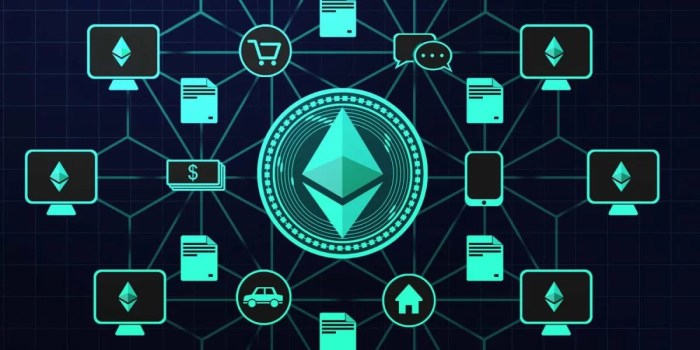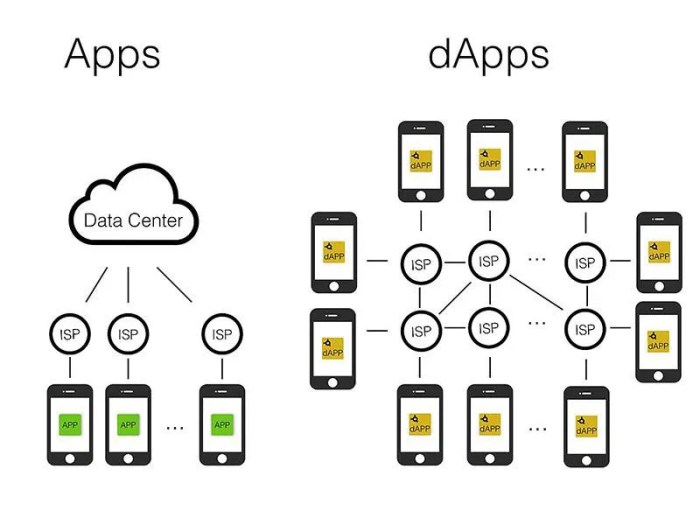Decentralized apps, or dApps, are changing the game in the tech world. Imagine a world where control is in the hands of users, not big corporations. This is the power of decentralized apps – putting the power back in the hands of the people.
From blockchain technology to peer-to-peer networks, decentralized apps are reshaping the way we interact with digital platforms. Let’s dive deeper into this cutting-edge technology.
Definition of Decentralized Apps

Decentralized apps, also known as dApps, are applications that run on a decentralized network of computers rather than a single centralized server. This means that no single entity has control over the entire network, making dApps more secure, transparent, and resistant to censorship.
Examples of Popular Decentralized Apps
- 1. Ethereum: A platform that allows developers to create and deploy smart contracts and decentralized applications.
- 2. Uniswap: A decentralized exchange that enables users to trade various cryptocurrencies without the need for a central authority.
- 3. IPFS (InterPlanetary File System): A decentralized file storage system that aims to replace HTTP for content delivery.
Benefits of Using Decentralized Apps
- 1. Security: Since dApps run on a decentralized network, they are less susceptible to hacking and data breaches compared to centralized apps.
- 2. Transparency: Transactions on dApps are recorded on a public blockchain, providing a transparent and immutable record of activities.
- 3. Censorship Resistance: Decentralized apps are not controlled by a single entity, making them resistant to government censorship or shutdown.
- 4. Lower Costs: By eliminating intermediaries, dApps can reduce transaction fees and operational costs for users.
How Decentralized Apps Work

Decentralized apps, or dApps, operate on a technology known as blockchain, which is a distributed ledger that records transactions across a network of computers. Smart contracts, self-executing contracts with the terms of the agreement directly written into code, play a crucial role in facilitating transactions within decentralized apps.
Blockchain Technology
Blockchain technology ensures transparency and security in decentralized apps by storing data in blocks that are linked together in a chronological chain. Each block contains a cryptographic hash of the previous block, making it resistant to tampering or alteration.
Smart Contracts
Smart contracts automate the execution of agreements between parties in a decentralized manner, eliminating the need for intermediaries. These contracts are stored on the blockchain and are automatically enforced when predefined conditions are met.
Peer-to-Peer Networks, Decentralized apps
Peer-to-peer networks enable decentralized apps to operate without a central authority by allowing users to interact directly with each other. This decentralized structure enhances security, privacy, and resilience, as there is no single point of failure in the network.
Decentralized Governance
Decentralized governance involves decision-making processes in managing decentralized apps without the need for a central authority. Participants in the network have a say in the development and governance of the app through consensus mechanisms, ensuring a democratic and transparent system of governance.
Development of Decentralized Apps
Developing decentralized applications involves several key steps, from conceptualization to deployment. Let’s explore the process, programming languages commonly used, and the challenges faced by developers in this innovative field.
Steps in Developing Decentralized Apps
- Define the problem or need that the decentralized app will address.
- Design the architecture and user interface of the decentralized app.
- Select a suitable blockchain platform for development, such as Ethereum or EOS.
- Write smart contracts to implement the business logic of the decentralized app.
- Test the decentralized app for security, scalability, and usability.
- Deploy the decentralized app on the blockchain network.
Programming Languages for Building Decentralized Apps
- Solidity: A high-level language used for writing smart contracts on the Ethereum platform.
- Vyper: Another language for Ethereum smart contracts, known for its simplicity and security features.
- JavaScript: Widely used for developing decentralized front-end applications and interacting with smart contracts.
- Go: Used to build decentralized applications on the Cosmos blockchain platform.
Challenges in Developing Decentralized Apps
- Security Vulnerabilities: Smart contracts are immutable and can contain bugs that are difficult to fix once deployed.
- Scalability Issues: Blockchain networks can face congestion and high transaction fees, impacting the performance of decentralized apps.
- User Adoption: Educating users about decentralized apps and blockchain technology remains a challenge for developers.
- Regulatory Uncertainty: Developers must navigate complex legal frameworks and regulatory requirements when building decentralized apps.
Use Cases of Decentralized Apps
Decentralized apps are making waves in various industries, revolutionizing the way businesses operate and interact with users. Let’s explore some of the key use cases where decentralized apps are being adopted.
Finance and Banking
In the finance sector, decentralized apps are transforming traditional banking systems by offering peer-to-peer transactions, smart contracts, and secure digital wallets. Examples include decentralized lending platforms like Compound and decentralized exchanges like Uniswap.
Supply Chain Management
Decentralized apps are also being utilized in supply chain management to ensure transparency, traceability, and efficiency. Companies like VeChain use blockchain technology to track the origins of products and verify their authenticity.
Gaming Industry
Decentralized apps have disrupted the gaming industry by introducing play-to-earn models, digital asset ownership, and decentralized marketplaces. Games like Axie Infinity enable players to earn cryptocurrency by participating in gameplay and trading virtual assets.
Healthcare
In healthcare, decentralized apps are improving patient data management, interoperability between healthcare providers, and secure sharing of medical records. Projects like Medicalchain are revolutionizing the sector by putting patients in control of their health data.